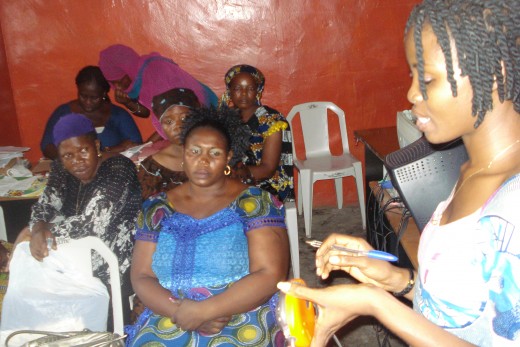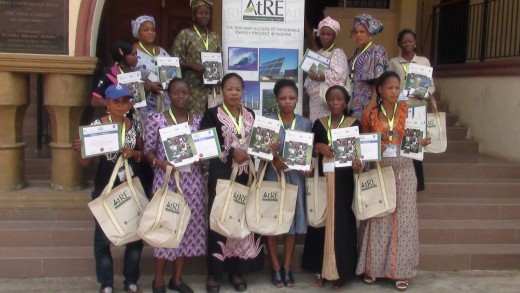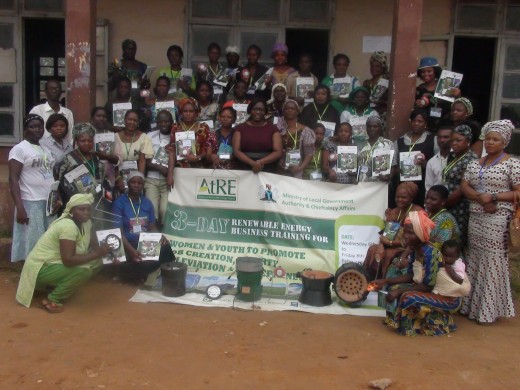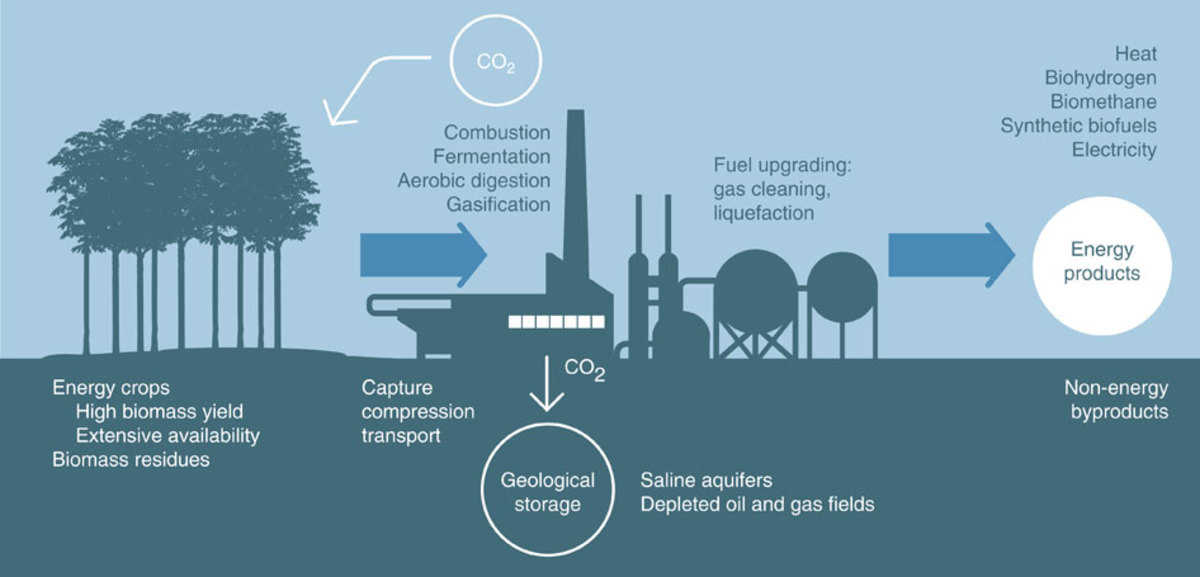DevA: An Organization Empowering Women through Micro-Enterprise

BY MARYRUTH BELSEY PRIEBE
“Charity never lives long; it dies in the short run, in a short space of time as funds run out.”
Meet Chimaobi James Agwu. He strongly believes that the independence people enjoy when establishing a micro-enterprise has the potential to be more powerful than monetary donations when eradicating poverty. With this mentality in mind, he started Development Access (known as DevA for short.) Agwu wants to eliminate energy-related poverty by giving women the chance to use and sell renewable energy products. The confidence this initiative creates results in a multiplier effect that can indelibly change whole communities for the better.
How Sustainable Financing Makes Families Healthier and Wealthier
In Nigeria alone, it's estimated that over 100,000 people are killed each year by illnesses connected to smoke inhalation. Over four-fifths of those who die are women, and young girls. This overwhelming disparity is due to the fact that females have no choice but to work with kerosene lamps and dirty-burning cooking stoves.
DevA is enthusiastic about giving women life-changing opportunities. This is achieved through new technology in the renewable energy sector, which empowers them to lead healthier lives and achieve financial security. The organization has launched two flagship initiatives to bring this opportunity to the masses. One is the RENTA program, a micro-loan scheme that gives women the financial backing they need to buy and sell renewable energy products. No handouts are given, and participants are expected to make a monetary contribution in return for the products they are provided with.
Thanks to the RENTA scheme, Nigerians on a median income will be able to obtain a safe supply of energy, like WakaWaka solar lamps and smartphone chargers and biomass cooking stoves. The fact that families don't need to pay for this technology in one lump sum makes it accessible to more people. Instead, a repayment plan over three or six months ensures the lights are affordable and financially realistic.
Such a simple program has the potential to save lives, not to mention save money. Even the most deprived Nigerian families can lower the monthly expenses they would have devoted to using fuel for cooking and lighting. It's a clear example of how sustainable support - instead of a fleeting handout - helps energy and financial poverty to become a thing of the past.
It isn't just families and individuals who are benefiting, but whole organizations. One such case is Limand Hospital, in the Lagos State town of Command. Previously, an expensive generator was relied on for providing patient rooms with lighting, but the organization purchased five solar lights from DevA. Now, as much as N1,000 (or $6.25) is saved every night thanks to this renewable and economical light source. Agwu explains that the lanterns are so powerful, it's hard to believe that the lights aren't electric. The technology has made the hospital a place for healing again, and not a place filled with smoke and toxic air.
For DevA, this isn't enough. The organization's plan is to ensure that profits made from the sale of solar lights is invested into Nigeria's women in the form of micro-loans. From here, they can start their own business, bringing solar lanterns and clean, safe cooking stoves to loved ones and their communities.

Deva's strategy begins by offering women thorough training on how to establish a business and create sales. They also learn about the advantages of renewable energy technology, and how it can be used. From here, the women will buy stock from DevA, enabling them to begin trading. If any of the trainees are unable to make an upfront payment for stock, DevA also provides seed inventory that will give their business a headstart. The expected end result is for this stock to be sold, with profits used to buy more inventory to sell.
Through these two key areas of the DevA initiative - RENTA financing and micro-loan funding - it becomes possible for renewable energy to empower women in a plethora of ways.
Agwu adds: “Internationally it is recognized that energy poverty is the worst poverty of all. This is why we are so keen on the relationship and collaboration with WakaWaka Solar Light.”
WakaWaka and DevA began collaborating to ensure that micro-loans to purchase solar technology was feasible. It gives Nigerians with little income the chance to make a positive change in their lives, with access to power to improve their quality of life immeasurably.
Finding and Financing Female Entrepreneurs: How Connections with Current Women's Groups Matter
Bringing this plan to fruition is often a challenge, with the DevA team regularly having to think outside the box. It's about generating a buzz through word of mouth, and building strong networks for distribution. Agwu believes that women's groups are an essential part of this strategy.
By capitalizing on the relationships that have already been cultivated with women's groups (both organizations that bring together tribes and families), DevA has the ability to achieve a number of important goals. The first is how such women's groups provide a much-needed structure for teaching whole communities on the advantages of renewable energy technology - teaching that's practically non-existent in many Nigerian regions. A lot of the time, the groups are also able to provide suggestions on which villages should be considered next, and introduce DevA to women who would wish to build their own micro-enterprise.
Women's solidarity groups also work with DevA when micro-loans are being distributed. Trust is vital, and that's why the women cross-guarantee each other, ensuring that the rate of payback is consistently strong.


Lastly, a benefit to using women's groups is how they are highly efficient in spreading the message about DevA into the remotest of villages. By endorsing WakaWaka solar lanterns and smoke-free cooking stoves to family and friends, more households are utilizing renewable energy for the first time.
DevA has discovered that focusing on the empowerment of women generates significant advantages for all. One example is how DevA used to capture a community's interest by offering free samples of the products they offer. It was an effective method, but the organization soon found that word of mouth was more powerful for generating demand for cleaner cooking stoves and solar-powered lighting.
In previous years, DevA also liaised with small retailers, asking if these shops would stock their products. Unfortunately, this strategy wasn't as successful as initially hoped compared to the programs that are used today. Agwu believes that this came down to several problems, saying: “We found out that with this method the opportunity for awareness is missing and the retailers paid the cost to the detriment of the end users. Secondly, the retailers tended to concentrate on selling the electricity appliances from which they have more profits as against the energy solutions we offer.”
It's an exciting time for the organization, which is now beginning to see how renewable energy is changing the lives of Nigerians for the better. Mama Omolara, a mother to four children, is one of them. She lives in Gidimo village in the state of Ogun, and made a living by selling household items from a modest kiosk.
Before DevA, Omolara and her children relied on two sources for light. The first was a kerosene lamp, with the other a bush lantern fashioned out of an empty tin and a wick. Wind would blow out the flame in the lantern, while the kerosene lamp was generating the dangerous fumes that take the lives of so many Nigerians annually. The problem was further exacerbated by the fire hazard both of these light sources caused. When fuel levels ran low, and her children could not complete homework, they would be flogged by teachers as a punishment.
This energy poverty is a distant memory thanks to DevA. Now, a solar lantern takes pride of place in the house, with family members jostling for control. She uses the light to generate further interest in the household items she sells, creating more profit for her family. Her children also get better grades at school thanks to a lifestyle change the western world takes for granted.
Now with a second solar lantern in their house, the Omalara family are not alone. DevA frequently hears other success stories from families across the country. Reflecting on the change his organization's association with WakaWaka is having, Agwu commented: “Access to affordable and sustainable energy unlocks development potentials across all segments of society.”
Work is continuing at DevA, with the organization buoyed by their successes so far. DevA's founder is now focusing on eradicating energy poverty completely, a goal that he believes is achievable within our lifetime. Agwu added: “We can actually conquer it within a five year period if all are serious and committed; why because energy pays its course and even returns a margin to the providers. It is an asset today and tomorrow.”








